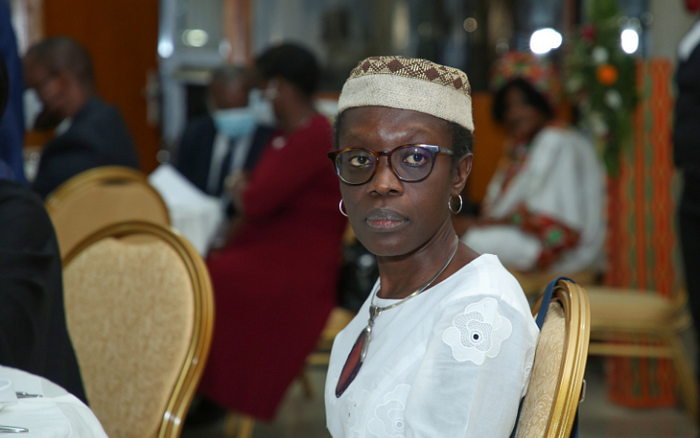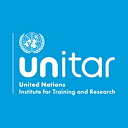
Name: Falmata Liman
Title: Political Affairs Officer, United Nations Office for West Africa and the Sahel
Country: Senegal
Training: UNITAR Training Programme to Enhance Conflict Prevention and Peacemaking in French-Speaking Africa
Falmata Liman serves as Political Affairs Officer in the United Nations Office for West Africa and the Sahel (UNOWAS), located in Senegal, which has the responsibility for preventive diplomacy, good offices and political mediation and facilitation efforts in West Africa and the Sahel. UNOWAS also works to consolidate peace and democratic governance in countries emerging from conflict or political crises. Falmata contributes to work on the front line of political affairs in the region.
Falmata was among the 31 mid- and senior- level officials to take part in the first dedicated UNITAR Training Programme to Enhance Conflict Prevention and Peacemaking in French-Speaking Africa conducted in 2020. A colleague who had participated in the UNITAR Regional Training Programme to Enhance Conflict Prevention and Peacemaking in Africa held in English recommended that she applies for the programme.
“Nine of the 16 countries covered by UNOWAS are francophone. And with a number of crucial elections planned in the sub-region, enriching my knowledge in conflict prevention and peacemaking was, if not indispensable, then highly important.”
Falmata analyzes the socio-economic and political situation in the countries covered by UNOWAS. She deals with cross-border and regional issues related to peace and security, where the emphasis is placed on the adoption of comprehensive strategies based on the link between security, development and human rights.
“The training was very important because it helped me to update my knowledge, was professionally stimulating, and strengthened my capacity to carry out this work. The training programme was also an opportunity to exchange, and to build new friendships and professional relationships, which are always very enriching and useful. The diversity of the participants was very important because it allowed different assessments to be made of the same situation, to put my own assessment in perspective, and to open new horizons.”

The UNITAR training programme offers a methodology that combines the theory and practice of interest-based negotiation to help the parties to conflicts move away from “positions” and deadlocks, to instead create negotiating space to pursue dialogue and a shared understanding of needs and concerns, and through constructive communications, to help improve the relationship between the parties.
The UNITAR Peacemaking and Conflict Prevention Programme has since 1993, been conducting tailored training programmes in peacemaking and preventive diplomacy for diplomats, UN departmental and peace operations staff, officials from regional organizations and civil society to support and enhance the vital work of the United Nations in these areas. The dedicated Regional Programme for Africa was created in 2000 and has trained to date more than 800 mid- and senior- level officials, peace mission and regional and subregional organization staff and civil society representatives in conflict analysis, negotiation and mediation. The first continental training programme in French for diplomats and government officials, staff of the UN, the African Union, regional economic communities, and civil society was held in 2020 with financial support from the people of Japan. The second edition of this Francophone training programme is scheduled in 2021, also with financial support from Japan.
The UN Secretary-General has identified conflict prevention as “the priority.” In addressing the Security Council, he said: “Peace is our most precious value and the essence of our work. All that we strive for as a human family depends on peace. But peace depends on us… One of the most effective ways to demonstrate our impact is to invest in prevention. We spend far more time and resources managing and responding to crises than on preventing them. Our approach needs to be rebalanced.”
After obtaining her PhD in Political Science from the University of Bourgogne (France), Falmata joined in 2001 the Organization of African Unity, which became the African Union in 2002, working in the Office of the Secretary-General and Acting Chairperson of the African Union Commission. She then joined for five years the African Mission in Burundi, the first OAU/AU peacekeeping mission, prior to working at the United Nations Office for West Africa (UNOWA). In 2016 and 2017, Falmata joined the United Nations Office to the African Union (UNOAU) before returning to the United Nations Office for West Africa and the Sahel (UNOWAS) where she served as Special Assistant to the Special Representative of the Secretary-General.
“During my professional career as well as in my research, I have learned that nothing is ever black or white and that most of the time, things are grey and that there are many shades of grey. The UNITAR training helped me to clarify and refine my analysis. The concept of ‘positive peace’ is another important takeaway from the training. I will use it to contribute to the refinement of a project that UNOWAS has been working on with partners, on ‘living together in peace in the Sahel and the Lake Chad Basin, affected by terrorism’, which has been paused for the time being due to COVID-19”.
“I appreciated the UNITAR training for the quality and diversity of the participants and resource persons, the content of the training, and cordial atmosphere. The training programme provided crucial tools and frameworks. The theoretical and practical aspects, including exchange of experience, were very useful.”
Falmata plans to continue her work for the UN for several more years before returning to research and training. During her studies, she was guided and assisted by a university professor and a former Minister of Foreign Affairs, which helped her achieve her dream of working in Africa for Africans. In turn, she hopes to share her experience and knowledge with young academics.
